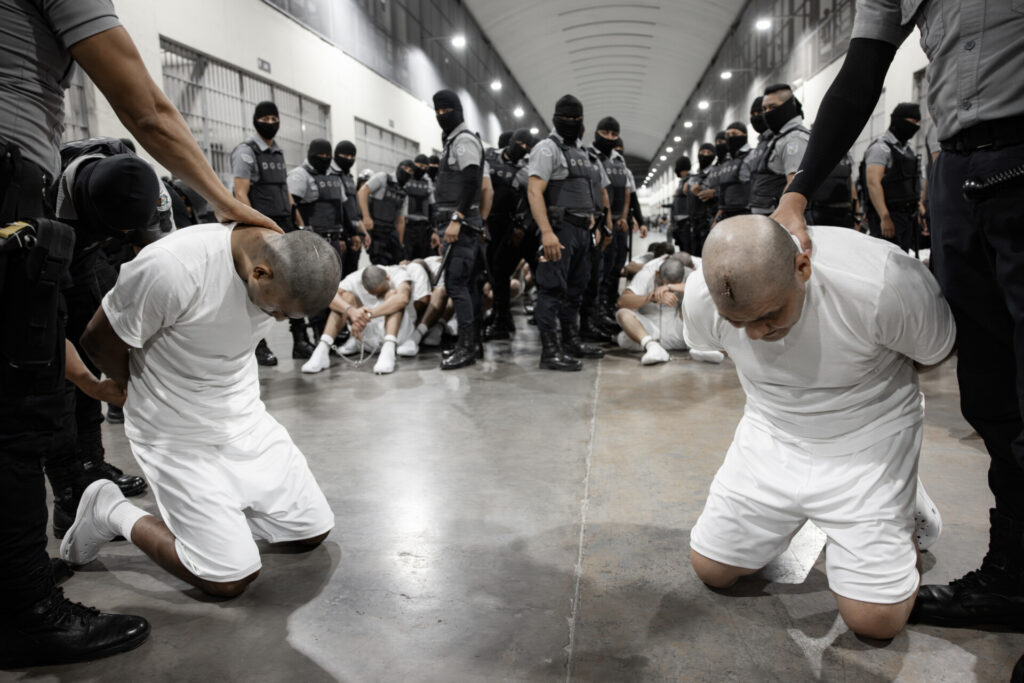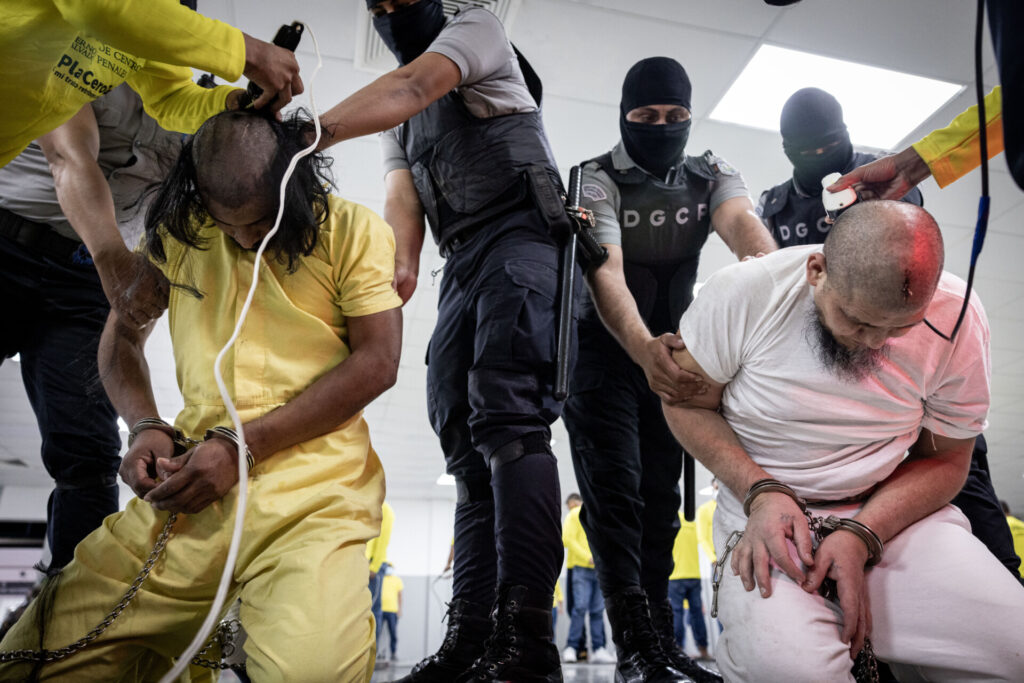The spectacle created by El Salvador’s incarceration of deportees from the United States seems to have reached its target audience: Donald Trump.
On X, Nayib Bukele, the president of the small Central American nation, posted a letter he received from Trump inviting him to the White House on April 14. “Your support of my efforts to combat illegal immigration is greatly appreciated,” Trump wrote to Bukele. “You have shown real leadership and are a model for others seeking to work with the United States.”
Bukele, who fancies himself “the world’s coolest dictator” and a “philosopher king,” loves highly manicured videos, like the propaganda montage trumpeting the 2023 rollout of CECOT (the Spanish acronym for the “Terrorist Confinement Center”), a megaprison notorious for its brutal conditions and human rights violations. CECOT is his geopolitical piece de resistance. He has invited YouTubers and influencers from around the world to visit it, to help spread his message of having “solved” crime in El Salvador.
On March 16, the U.S. Department of Homeland Security (DHS) transferred over 200 people who the Trump administration accused of having ties to the Venezuelan gang Tren de Aragua, along with two known leaders of the Salvadoran gang MS-13, to CECOT. One of the two leaders had his federal terrorism and narco-terrorism charges dismissed four days earlier because of “sensitive and important foreign policy considerations,” according to an unsealed Justice Department letter. Bukele has sought to get hold of MS-13 leaders who may testify against his government in U.S. courts. Only 23 of those sent were Salvadorans, according to the Trump administration, which did not produce evidence that the men were all associated with gangs.
Beyond the rights abuses and violations of U.S. and international laws — putting Venezuelans on planes without due process and sending them to a prison in El Salvador is not exactly lawful deportation — what stands out from the Trump administration’s actions is the performance they conjured.

The March 16 footage of the men’s transfer received 23 million views on X and saw heavy rotation across American broadcast news. These highly curated images are part and parcel of Bukele’s broader agenda, serving as a commercial for CECOT, whose services he aims to continue to sell to the United States and, he hopes, to other countries as well.
Roman Gressier, who edits the English-language edition of the Central American investigative outlet El Faro, told New Lines that access to CECOT is tightly controlled. Its role within the prison system centers around being the public face of Bukele’s war on crime, yet the independent Salvadoran press has been unable to enter the megaprison.
“It’s just the shiny one. It’s the prison facility that the administration wants international media to talk about,” Gressier told New Lines.

“He’s selling himself as a punisher of crime. He needs to repeat that message as much as possible,” Gressier said, referring to Bukele. “And going to the White House is another way of doing that. It’s a way of raising his profile even more.”
Bukele first pitched the services of his massive prison complex to Washington publicly in February, offering to hold 300 “convicted criminals,” including U.S. citizens, in exchange for a fee. Bukele had previously stated that it costs $200 million to run El Salvador’s prison system annually and that he was only looking for $6 million per year from the U.S.
Meanwhile, U.S. officials have responded with a remarkable willingness to share and seemingly emulate the kind of propaganda characteristic of the Salvadoran government’s promotion of CECOT.
The White House released its own videos touting the Trump administration’s deportation efforts and celebrating its collaboration with Bukele.
The conservative American street interviewer Nick Shirley, who started out as a prankster on YouTube, appeared on Fox News to break down his recent visit to CECOT after the transfer. He first toured the prison facility last summer, where he parroted Bukele’s messaging and praised him for “solving crime.” His most recent trip followed a similar theme and celebrated Bukele’s collaboration with the Trump administration.
The official X account for the White House posted a video titled “ASMR: Illegal Alien Deportation Flight.” Autonomous sensory meridian response (ASMR) is a specific type of social media content typically characterized by sounds like the clicking of a keyboard or hushed whispers that some find soothing. The White House’s ASMR video featured rattling chains and handcuffs placed on detainees, a production lampooned by the Daily Beast as “deportation porn” for its core message that placing “other human beings in chains makes us feel good.” An article from The Nation called the video “slavery porn,” lamenting how the Trump administration is presenting the contents as “a model of what federal employees should be doing: stripping away the humanity and livelihoods of foreign-born people.”
Yet it is precisely the brutality and dehumanization on display that U.S. officials appear to be showcasing in their proud partnership with El Salvador.
DHS Secretary Kristi Noem, donning her now signature bulletproof vest and ball cap, captured this sentiment in her recent visit to the CECOT facility. Standing against a backdrop of a crowded cell full of male inmates clustered around bunk beds, she stared into the camera and gave her warning to the rapists, murderers and terrorists.
“First of all, do not come to our country illegally — you will be removed and you will be prosecuted,” Noem said. “But know that this facility is one of the tools in our toolkit that we will use if you commit crimes against the American people.”
Speaking with Fox News about her tour of CECOT, Noem said she sought to send a message “to terrorists” and provide U.S. citizens with transparency. “They were able to see exactly where we are sending these people who have murdered and raped Americans,” she said.
Many of those forcibly sent to El Salvador did not have criminal records in the United States, according to court filings from the Trump administration. A U.S. Immigration and Customs Enforcement (ICE) official confirmed this in court documents filed on March 17 but reasoned that “the lack of specific information about each individual actually highlights the risk they pose.”
The CBS News program “60 Minutes” found no criminal records for 75% of the Venezuelans sent to CECOT, and the vast majority of criminal records the program found were for nonviolent offenses. Bloomberg found that 90% of the 238 sent to the megaprison had no criminal records in the U.S. So far, only a dozen have been found who were charged with the “worst of the worst” crimes for which the administration promised to exact punishment.
But these are mere details that seem not to matter to the Trump administration. Appearing on Fox News, Trump border tsar Tom Homan summarized the general attitude toward this deportation strategy when he said: “I wake up like a kid in a candy shop every day getting ready to go to work.”
The Trump administration has also been promoting what it calls “self-deportation.” Self-deportation, or “attrition through enforcement,” is not a new idea. Republican presidential candidate Mitt Romney pitched this policy in 2012. By denying undocumented immigrants opportunities to work, he reasoned, they would self-deport and go elsewhere in search of economic opportunities. The American Immigration Council, a nonprofit, pro-immigrant advocacy group, cautioned at the time that such efforts would encourage states to pass laws denying basic services to anyone who could not prove legal immigration status. When Trump ran for president in 2012, he criticized Romney’s position, saying it alienated Asian and Hispanic voters. Nowadays, Trump is all for it.
Under Trump, attrition is sought through the spread of fear. The transfer of people to CECOT serves the same function as the Trump administration’s Guantanamo Bay stunt, which saw a group of Venezuelans flown by military plane to the U.S. naval base in Cuba. Shortly afterward, when it became clear that the base was ill-prepared to receive the transferred migrants, they were returned to the U.S., leaving an abandoned tent city in their wake. In both cases, performative deportations aimed to celebrate violence against a group of people as well as their humiliation. It is a draconian spectacle designed as much for its entertainment value to Trump supporters as to strike fear into the hearts of the undocumented (and, by extension, anyone who speaks Spanish — or, potentially, any foreign language — in public).
In early March, DHS relaunched a mobile application created by the Biden administration that allowed immigrants to schedule appointments at ports of entry to file for asylum and track their immigration proceedings. Named CBP Home — after the Customs and Border Protection agency that administers it — the app was launched to provide temporary legal pathways to asylum-seekers at the southern border, something the current administration aims to revoke. Under Trump, migrants who benefited from the app have been encouraged to leave immediately. The app was taken down when Trump first took office, and then rebranded as CBP One. It now includes a new “self-deport reporting feature.” It’s unclear how an app for migrants to report their intent to leave the U.S. is supposed to target members of criminal organizations.

Likely to his chagrin, Trump’s dreams of mass deportations have run into several obstacles. In addition to what he deems “activist judges,” whose rulings have slowed his actions around deportation, not every country is willing to accept people deported en masse. Venezuela has a particularly tense relationship with the U.S., so the president has less leverage to pressure them into accepting repatriation of their own nationals — hence the search for an alternative destination.
On March 31, the Trump administration acknowledged to a federal judge that, in an “administrative error,” one of the men sent to El Salvador was removed from the U.S. despite receiving protected status in 2019. They added, however, that there was nothing they could do about the error now since the wrongfully deported man was already at CECOT. On April 10, the Supreme Court ruled that the administration must “facilitate” the man’s return. The Trump administration failed to meet its Friday deadline for his return, arguing it was “impractical” and asking for an extension until Tuesday. When asked if he could be returned to the U.S. when Bukele visits, the White House press secretary said the Supreme Court ruled they must “facilitate the return, not to effectuate it.”
How this saga will unfold over the next few days or weeks may clarify legal boundaries, which the administration may keep pushing. For now, at least, the optics of Trump’s immigrant purge make it a winning strategy with his base, who love the lurid images from CECOT and want to see more of them.
Sign up to our mailing list to receive our stories in your inbox.



